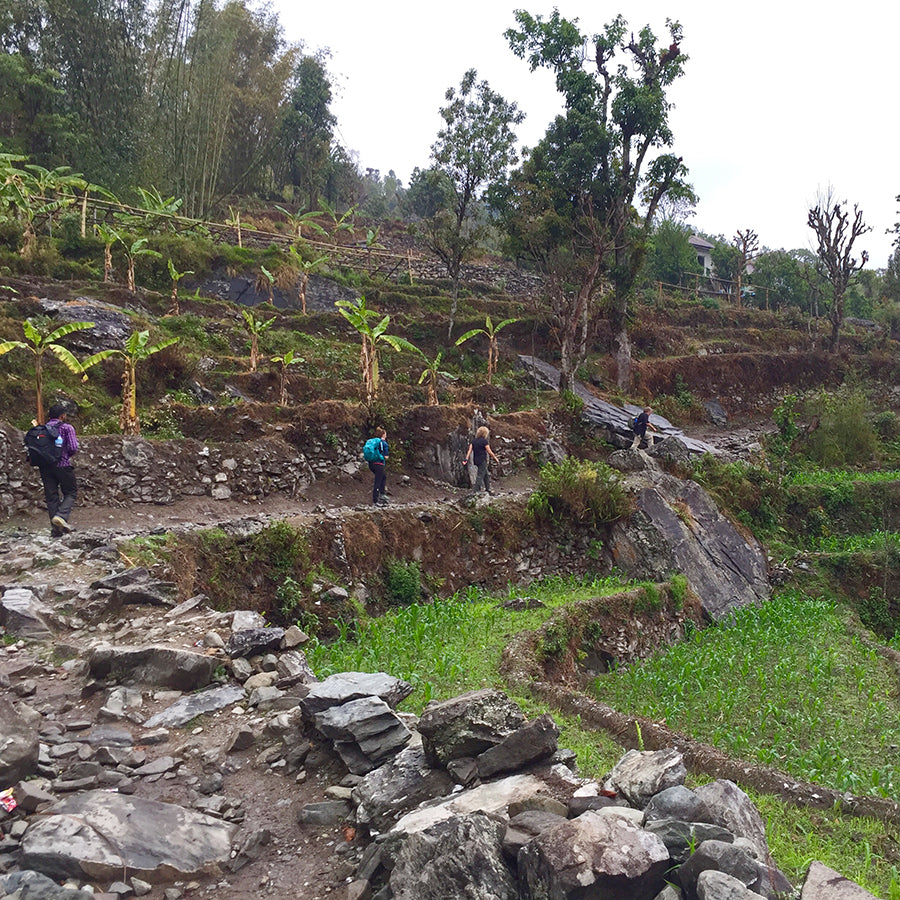We wake up feeling a sore sort of fresh, invigorated by the mountain air. Our noses lead us to a plate of local potatoes and miniature boiled eggs served with Himalayan dipping salt. We have now developed a breakfast routine: coffee followed by tea, both drinks being accompanied by speculation on what the day will hold. After we filter water and fill our water bottles we strike off towards the local market.
Today is the day that all of the surrounding villagers descend from their respective mountainous communities and peddle what they are able to, or were able to carry, in the town square.
As it is still early, most people are still in the process of setting up shop. The agricultural avenue in the center of town is thronged with farmers and customers alike. Here we encounter many dZi supported agriculturists (they are easy to spot because their cornucopia of flora is recognizably more vibrant and colorful than the offerings of other farmers). Organic is the way of life here; there is no need to advertise it. Dangerous and costly artificial fertilizers and pesticides are ousted in favor of permaculture practices. The knowledge of the soil in these mountains runs deep. It was really interesting to hear firsthand how dZi’s agricultural programs have affected peoples’ businesses, families, and their day to day life so significantly and in such an overarching manner.
As we left we skirted around the outer edge of the market, peering on as bundled bamboo baskets of live piglets and chickens were being bartered over. The truly remarkable sight was found at the corner of the market, the local butcher. He and his 7 year old son were happily chopping away at different cuts of various animals, and not a scrap of the livestock, hide or tail, was wasted on their watch. As we wound our way back out of the market, another frisbee session spontaneously ensued at the school and we limbered our muscles for the long hike ahead along with various community members who were drawn from the fray. Most memorably, a local female elder in her vibrant outfit who, hesitantly at first, joined in and showed up nearly everyone with her flawless frisbee skills.
We teetered and tottered our way up and out of the ridge and on our way to neighboring Bung. The walk was broken up by black tea pit stops with breathtaking views of the valley, and the occasional trailside dance party, always instigated by Jitna.
We wound our way parallel to the river far below, out of sight but not out of mind, as its roaring occasionally penetrated the vertical foliage and found our ears on the trail. The trailside was littered with blooming flowers–not the plastic blooms that are typical of the developing world–marking our entrance to the “no plastic zone.” There is something truly special about unmarred natural spaces, houses that belong in and complement the wild surrounding them, and the people that seem to flow with it, all meant to be.
 Halfway to Bung we encounter a massive landslide, the byproduct of earthquake tremors. The sight is common all around the valley: white scars running down otherwise lush, green vertical slopes, but encountering one first-hand is unnerving. It is as if some invisible malicious ground spirit has raked the earth bare with its massive claws. In one of the community planning sessions, a pathway over the landslide was recognized as a priority and dZi, with the help of their local partner NGO, made magic happen. The new path is carved out of the rubble and the trail leading into and out of it is meticulously cared for with rhododendrons planted alongside pine along the whole pathway.
Halfway to Bung we encounter a massive landslide, the byproduct of earthquake tremors. The sight is common all around the valley: white scars running down otherwise lush, green vertical slopes, but encountering one first-hand is unnerving. It is as if some invisible malicious ground spirit has raked the earth bare with its massive claws. In one of the community planning sessions, a pathway over the landslide was recognized as a priority and dZi, with the help of their local partner NGO, made magic happen. The new path is carved out of the rubble and the trail leading into and out of it is meticulously cared for with rhododendrons planted alongside pine along the whole pathway.
As the sun sets into the far side of the range, the last of the sun’s rays dying glow highlights some of the far off villages on the other side of the valley. As we arrive in the quaint and colorful village of Bung our thoughts are on the much more isolated villages located in the higher reaches, looking out over us from the other side of the river. Many people from these villages will make the trip to Sontang for the weekly market, an endeavor that makes our trek look more like mellow meandering.

Bung is slightly more developed, an area famous for its benevolent treatment by Sir Edmund Hillary who constructed schools and hospitals here in the 1960’s. Back then, before trains, planes, and automobiles entered Nepal, this was on the main hiking route in from India for explorers with dreams of surmounting the tallest mountain in the world, Everest.
We are greeted by members of the local partner NGO, have a delicious dinner with Jitna, Jhanak, and our friendly porters, and are off to the tents to sleep. The overhanging villages look across the valley and over us in our dreams.
Go back to days 1 -3 here.
Continue on to day 5.
The post TREKKING THROUGH NEPAL TO SPREAD A WORLD OF GOODS: DAY 4 appeared first on Mexicali Blues Blog.



